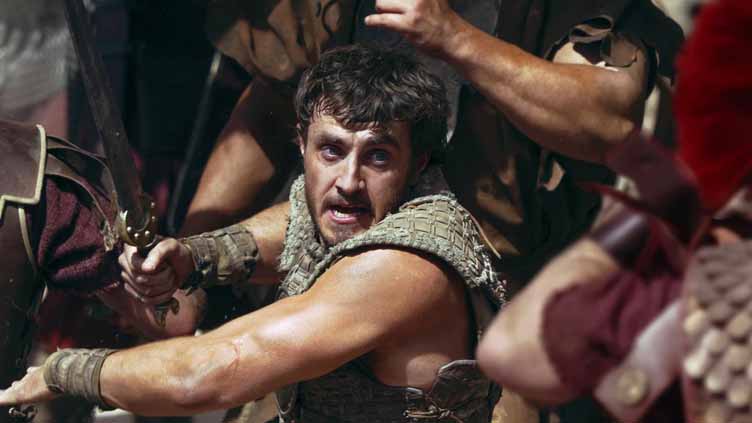Movie Review: 'Gladiator II,' with Denzel Washington, goes back into the arena

Entertainment
This dichotomy — a fallen society and its insatiable need for entertainment
LOS ANGELES (AP) - Rome teeters on the brink in Ridley Scott’s “Gladiator II.” Its fall is said to be imminent. The dream it once symbolized is dead. The once high-minded ideals of the Roman Empire have deteriorated across a venal land now ruled by a pale-faced emperor.
On the throne is Geta (Joseph Quinn), who sits alongside his sniveling brother, Caracalla (Fred Hechinger). The heart of this Rome, of course, is the Coliseum, where throngs cheer for the gladiators who fight and die. There, the ageless Scott remains remarkably at home. The arena, with its eruptions of spectacle and violence, is a stand in for the director’s own vision of the big screen: Go big or go home.
This dichotomy — a fallen society and its insatiable need for entertainment — is the clever and not altogether flattering backdrop of the “Gladiator” films. Part two, set 20 years after the events of the first movie, brings a new combatant to the Coliseum — a mysterious outsider named Lucius Verus, played by Paul Mescal. And to answer the inevitable question, yes. Yes, I was quite entertained.
“Gladiator II” isn’t quite the prestige film the first one, a best-picture winner, was in 2001. It’s more a swaggering, sword-and-sandal epic that prizes the need to entertain above all else. No one in “Gladiator II” understands that more than Denzel Washington. His performance as the Machiavellian power broker Macrinus is a delicious blur of robes and grins – so compellingly over-the-top that he nearly reaches 1990s Al Pacino standards.
Inside this Rome are scattered interests in toppling it, including Marcus Acacius, a decorated general who has just returned from a successful campaign taking Numidia in northwest Africa. (That siege makes the movie’s blistering opening, with an armada racing at almost NASCAR speed toward the walled city, with towers on the bows of the boats to scale the parapets.)
Acacius is a loyal Roman but, when he learns that the emperors have only more bloodlust for further territory and more war, he and his wife, Lucilla (Connie Nielsen) begin plotting to overthrow the brothers.
In a movie where everyone nurtures some secret, few stay hidden long. Foremost among them is Lucius Verus, a warrior in Numidia who’s taken prisoner and forced to fight as a gladiator. He’s the son of Lucilla and Maximus (Crowe in “Gladiator”). Following the events of that film, Lucilla sent him, an heir to the empire, to Numidia to grow up outside of the empire’s power struggles.
Mescal, the terrific Irish actor of “Aftersun” and “All of Us Strangers,” smoothly steps into a blockbuster arena for the first time. “This one is interesting,” says Macrinus, eyeing him for the first time. Mescal’s Lucius is vengeful — the Roman army kills his warrior wife in the Numidia battle. “Rage pours out of you like milk,” Macrinus says, admiringly. The glint of mischief in Mescal’s eyes gives Lucius a little more character than your average revenge-seeking gladiator.


